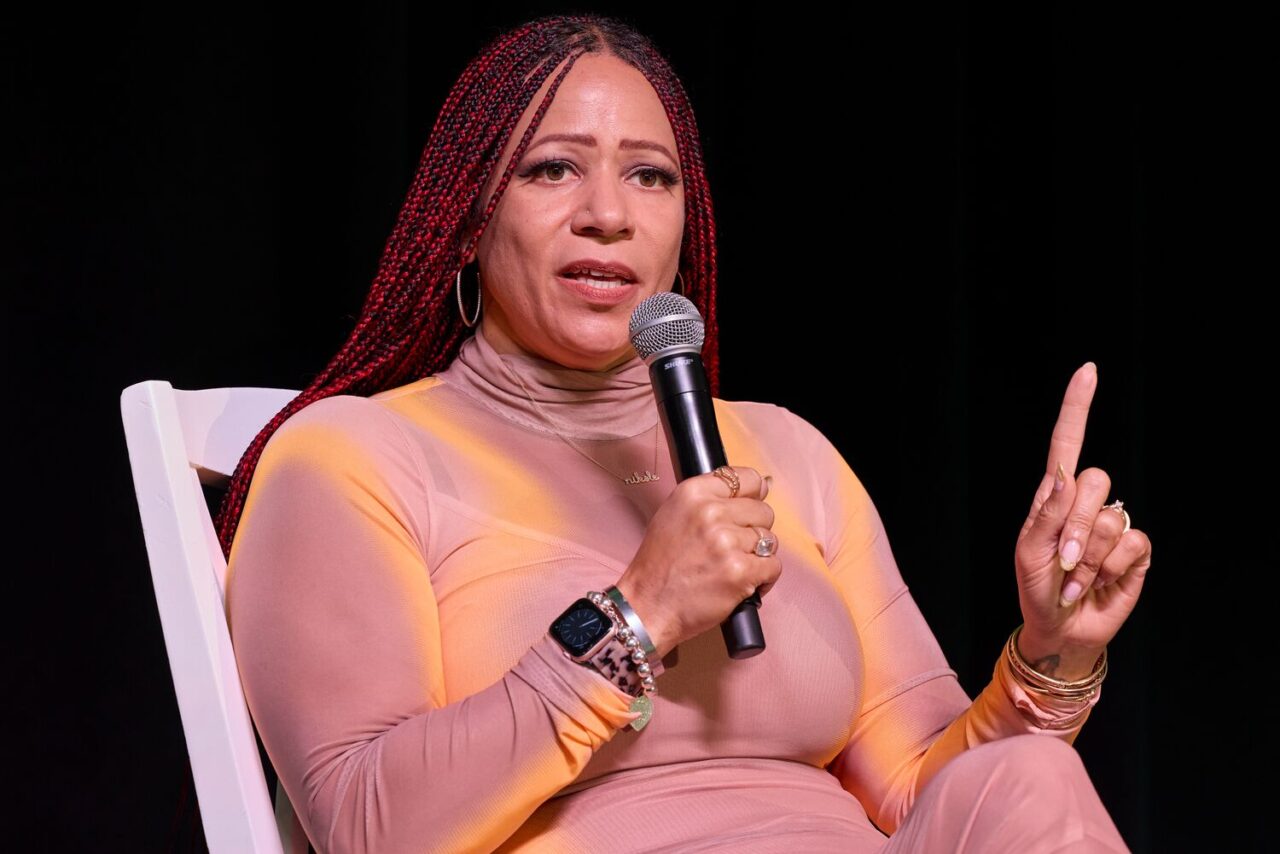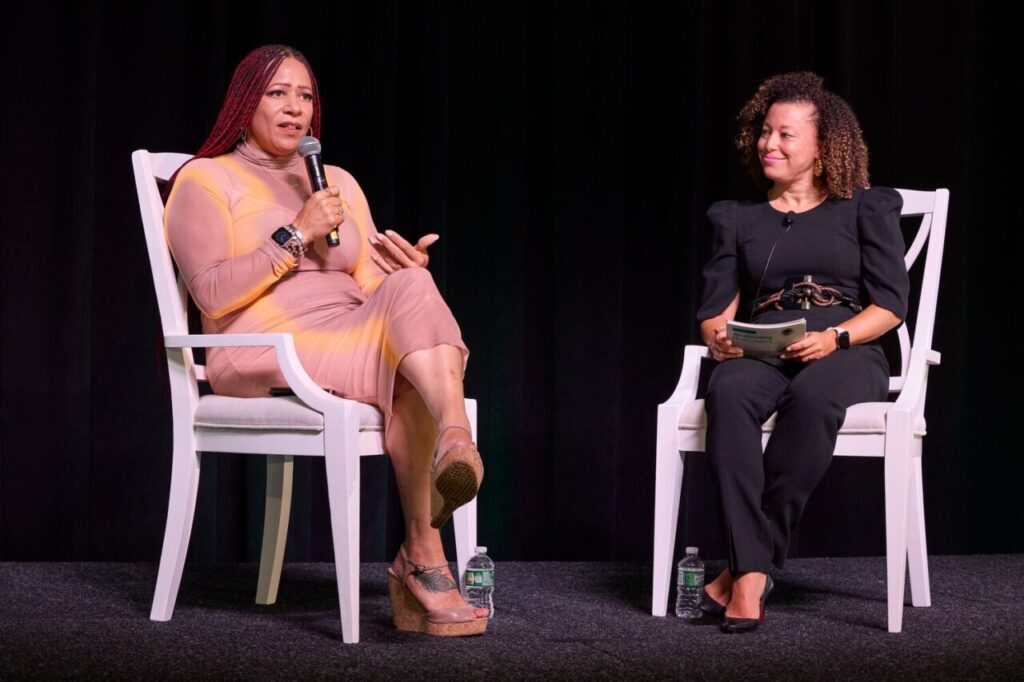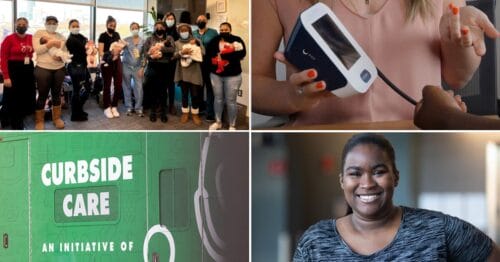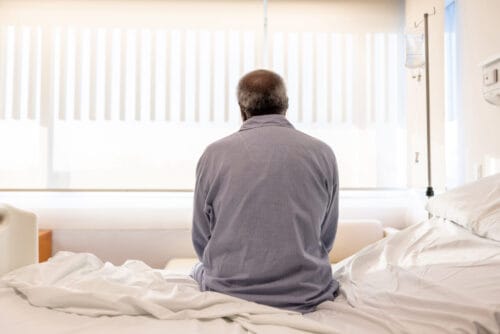“We Are on the Side of Right”: Nikole Hannah-Jones Opens EQTY 2024 With Message of Choice
September 12, 2024

Boston Medical Center
Nikole Hannah-Jones delivers the keynote at EQTY 2024.
The Pulitzer Prize-winning creator of the 1619 Project delivered the keynote address at BMC Health System’s second annual conference of equity leaders.
“Today, we are here to end the blame-game,” says Thea James, MD, MBH, in her opening remarks at Boston Medical Center Health System’s second annual EQTY conference, EQTY 2024: Accelerating Health Justice. “To shed ourselves, and others, of the mythical notion that poverty and poor health outcomes are a ‘fact’ of Black, Hispanic, and Latino American life.”
Instead, James continues, that together with the equity leaders in the packed room at the conference’s venue, the Artists for Humanity Epicenter in Boston, we should concern ourselves with the actual fact that we can ensure that decades of structural inequities in health care will no longer dictate the future.
EQTY 2024’s focus is beyond merely identifying racial health inequities but highlighting and creating ways to advance change. Aligned with this theme, reckoning with and working to break the constructs of our country’s past is a common theme as the day opens Thursday morning.
The 1619 Project and foundation of slavery in America
James then welcomes to the stage Rachel Felix, Senior Vice President and Chief Marketing and Growth Officer at BMC, who hosts a sit-down, fireside chat keynote with the illustrious Nikole Hannah-Jones, Pulitzer Prize-winning creator of the 1619 Project. The 1619 Project is an ongoing initiative with the New York Times Magazine that began in 2019, marking the 400th anniversary of the beginning of American slavery. It places the consequences of slavery at the center of our country’s narrative.

“If we want to grapple with our society, we have to get to the root of it. So often the history we’ve all been taught is a history of a mythology about America,” Hannah-Jones says, “What the 1619 Project is, in essence, is a work of memory. It is saying that ship called the White Lion did arrive off the shores of Virginia in 1619.”
“What happened in 1619 is shaping our society whether we acknowledge it or not,” she adds.
The systemic creation of racial inequities
As Hannah-Jones begins to speak, she looks to the front row and sees Andre Perry, PhD, Senior Fellow and Director of the Center for Community Uplift at the Brookings Institution, as well as a speaker in a panel later in the day. She recalls something that Perry once told her.
“There’s nothing wrong with Black folks that getting rid of racism won’t resolve,” she says, quoting Perry. She explains that our inequalities were created, they’ve been a societal choice, all tying back to how the foundation of our nation is slavery.
Slavery’s impact is still clear today in segregation, redlining, and the history of “separate but equal” and how these policies affect Black and Brown communities and access to housing, schools, and healthcare. Where you live, Hannah-Jones explains, is going to determine nearly everything of quality in your life.
“Black people don’t just so happen to be more sick than other people. We live in a society that makes us more sick,” she says, “and if we don’t understand that, then we try to fix Black people instead of the systems and conditions.”
Seeing beyond our illusions
Fixing these systems is what the equity leaders attending EQTY 2024 are working to do. But to truly do this, Hannah-Jones compares the active choice we all have to make to a popular 1990s movie.
“I can compare the 1619 Project to taking the red pill in the Matrix,” she says. In the Keanu Reeves movie, the red pill allows his character, Neo, to understand the reality behind the Matrix’s illusion. In this metaphor, the illusion is the mythology of our nation’s history that the 1619 Project is asking readers to reject. The red pill stands in opposition to the blue pill, which is a choice to remain in the illusion.
“Once you take the red pill, then you have two choices,” she continues. “You have to say, if I know about the reality, I have to do something about it. Or you say, I know about the reality, but I don’t want deal with it at all.”
Black people don’t just so happen to be more sick than other people. We live in a society that makes us more sick, and if we don’t understand that, then we try to fix Black people instead of the systems and conditions.
Nikole Hannah-Jones, creator of the 1619 project and eqty 2024 Keynote speaker
She says that too many people choose to take the blue pill, or to ignore or comfortably live with racial health equities and their creation in our country’s history with slavery. That, she says, is an active choice. A choice she knows that the attendees in this room will not be making. It’s a sentiment that James spoke to in her opening speech.
“Collectively, we will innovate,” James said. “There are real people waiting for our action.”
The human lives informing equity work
This journalistic and advocacy work has been informed, as it has for many, by real loss and the consequences of systemic racism in Hannah-Jones’ life.
She opens up about her uncle who died prematurely at age 50 of cancer. A blue collar worker, she says that he had access to employer-sponsored health insurance off and on through his life. At the time when he was feeling back pain, he did not have insurance and so visited the free clinic. Rather than an MRI or other diagnostic testing, they referred her uncle to a chiropractor. He would later find out he had cancer, and it was spreading through his spinal cord. The chiropractor not only didn’t help, they likely unknowingly helped the spread of cancer through his body.
“Every data point that we’re working with is representing an actual human being, an actual human story,” Hannah-Jones says. “And an uncle who died before he could get any Social Security that he paid into any or the medical benefits that he paid into at the age of 50.”
When Felix asks Hannah-Jones how to keep the fire alive, as advocates and equity leaders, while also caring for ourselves, the Pulitzer Prize winner again spoke about the people in her life.
“I, personally, always center myself in a Black woman named Marlene Tillman, who was my grandmother, who had a fourth-grade education, who was born on the cotton plantation in Greenwood, Mississippi, who had every dream and vision that any other human being had but was born into society where she could realize none of them,” she says. “And she got on the train to Illinois when my dad was 2 years old and was determined her children would never pick cotton.”
It’s thinking of her grandmother that leads Hannah-Jones to, once again, look back into history.
“I always think of my work as repaying debt. Not a debt that I feel is a burden to me, not a debt that I feel upset that I have to pay, but I have a debt to repay,” she says. “I have a debt to repay to my direct ancestors and to our collective ancestors because they have provided me the life that I have. And now I have to work to ensure that every American can live that life. I’m working on behalf of the greater good.”
Looking out to the audience of attendees and other panelists, she speaks directly to them about keeping the fight alive.
“This struggle is one where it doesn’t feel like we get nearly enough victories, but we are on the side of right. We are doing the work that believes in our community, that believes in people, that believes that there’s enough for all of us,” she says, “and I find that extremely fortifying.


